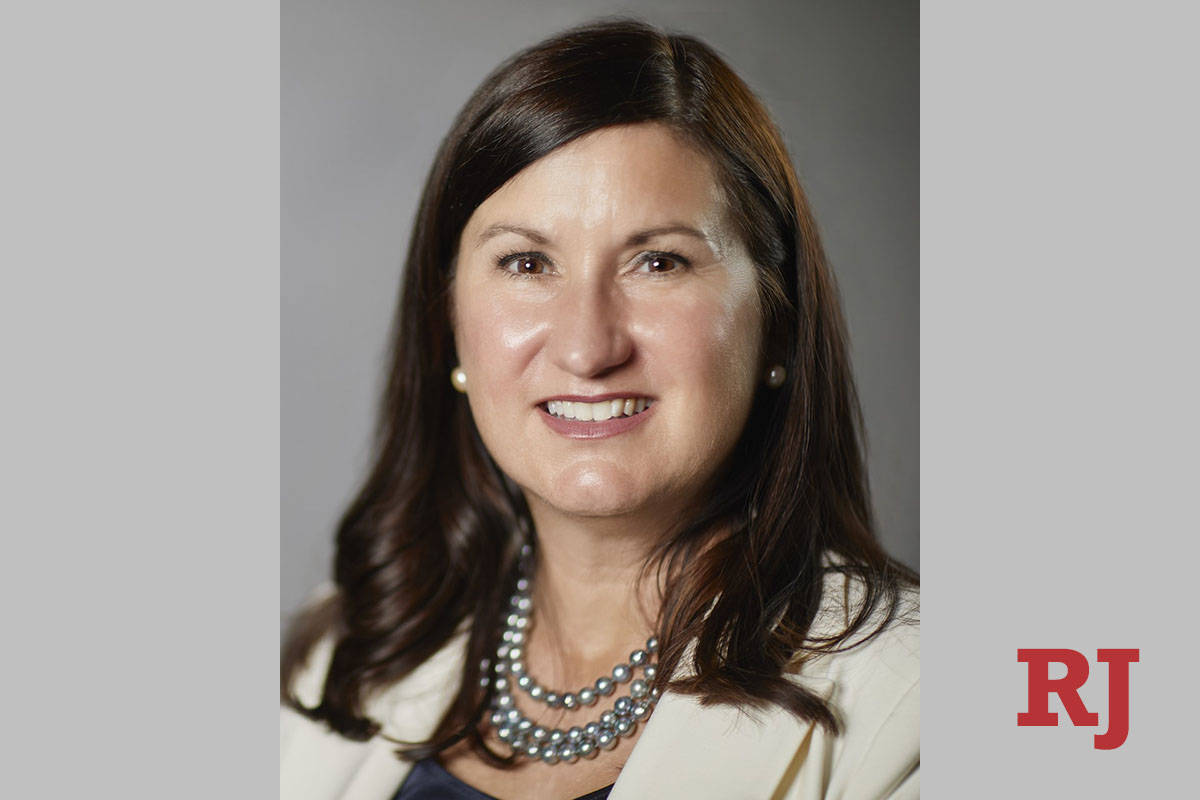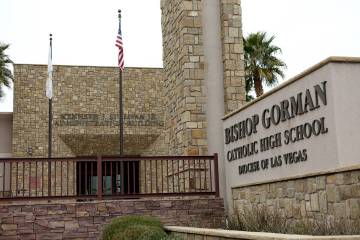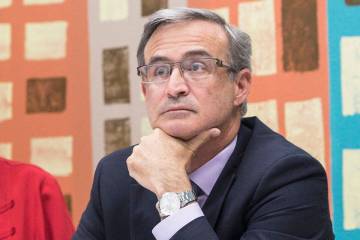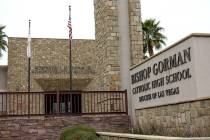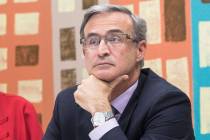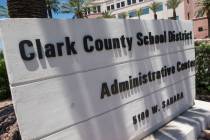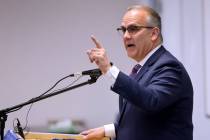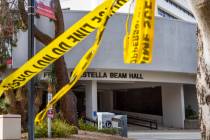New chancellor of Nevada’s colleges takes over in turbulent times
Nevada’s higher education system has a new leader to guide it through the challenging times of the COVID-19 pandemic.
Melody Rose, who has 25 years of experience in higher education and was previously chancellor of the Oregon university system, took the helm Sept. 1 as chancellor of the Nevada System of Higher Education.
NSHE’s Board of Regents voted to hire Rose, who most recently worked as an independent consultant to universities, in June following a recommendation by a search committee. Her four-year contract runs through Aug. 31, 2024, at a base salary of $437,750.
In an interview with the Review-Journal, Rose said she’s not “an ivory tower academic,” explaining that she grew up in a “pretty disruptive” household with a mother who was a teenage parent and a father who struggled with addiction issues. That “makes me like a lot of our students,” she said.
The COVID-19 pandemic is a strange time to start a new job, Rose acknowledged.
“My focus … has really been getting around to some of our key internal stakeholders,” she said, adding that she did plenty of listening last week during sessions with faculty members, students, campus presidents and Board of Regents officers.
This week, Rose plans to meet with officials in the governor’s office and state legislators.
“I’m really excited to start those conversations,” she said.
Rose is responsible for overseeing eight schools in the state’s public higher education system: UNLV and the University of Nevada, Reno, Nevada State College in Henderson, four community colleges and the Desert Research Institute. Those schools serve more than 100,000 students.
Outgoing NSHE Chancellor Thom Reilly, who was appointed in June 2017, announced his resignation last year. His contract was extended to Dec. 31 because of the COVID-19 pandemic.
COVID-19 response
Six months of the pandemic have forced 60 years worth of innovation in higher education, jarring people out of complacency and forcing organizations of all types to think about “serving modern needs of modern students,” Rose said.
COVID-19 is obviously top of mind for everyone these days, Rose said, adding that all NSHE schools have worked tirelessly in their responses and are keeping employee and student safety “at the heart of their thinking.”
Reopening plans are extensive, thoughtful and based on medical science and the “counsel of experts within our institutions,” she said. “What I appreciate most about their planning is their plans are flexible.”
Rose said she asked for an update on case counts at campuses and as of Friday, numbers were low.
“Overall, I have to say I was so pleased by what I heard,” she said.
Each school will submit its case counts to NSHE every Friday, and the figures will be posted on the higher education system’s website, Rose said.
“Folks will know how we’re doing,” she added.
Rose also said: “Campuses have huge numbers of people on them, so it’s understandable we’re going to have some cases. The goal really has to be the prevention of community spread.”
Las Vegas-area colleges and universities are conducting the vast majority of their classes remotely this fall. Since fall semester began Aug. 24, UNLV has reported 12 COVID-19 cases, while CSN has reported eight cases and NSC has reported four.
As a result of the COVID-19 outbreak, NSHE is facing $137.8 million in budget cuts, prompting regents to take several actions since April to stem the financial impact.
Rose said she talked last week with Board of Regents leaders about the new budget reduction response committee. Updates will be discussed at a public meeting this month, she said.
The committee’s work will be an “open and transparent process with stakeholders at the table,” she vowed.
Coronavirus-spurred budget issues aren’t unique to Nevada or the United States, Rose said, adding that other places are also facing economic impacts.
For NSHE, the goal is always “holding students harmless to the best of our ability,” she said.
In April, however, NSHE’s Board of Regents approved a temporary student surcharge, ranging from $3 to $8 per credit, for this school year. And it came just months after regents approved dozens of fee increases.
Other priorities
Rose said transparency is key for NSHE because policymakers and taxpayers have made significant investments in the state’s colleges and universities. It’s important to look at “how to build trust in a positive, productive way,” she said.
And in addition to keeping a close eye on the COVID-19 situation, NSHE needs to stay laser-focused on student success, Rose said.
It’s predicted that higher education enrollment will be take a major downturn starting in 2026 because the birth rate dropped during the economic recession about a decade ago, Rose said.
“Smaller cohorts will start showing up on campuses nationally,” she said.
Nevada has an advantage because people are moving to the Western U.S. and certain populations are increasing their higher education attendance, she said, noting that the Latinx population is a growth area.
“Knowing that, we really have to be thinking deeply and prioritizing inclusion,” Rose said, adding that the higher education system needs to be recruiting “more Black and brown students to our institutions.”
She said that real headway has been made in the past few years but that NSHE needs to keep a close eye on retaining and graduating those students in equal proportion to white students.
‘Chaotic’ childhood
Rose said something that doesn’t necessarily come across on her resume is that “my background is so similar to so many students in our NSHE institutions.”
“My life as a kid was pretty chaotic,” Rose said. “I like to say our household generally had more beers than books in it.”
Rose’s family moved around frequently. If you name a town in California, she said, she probably lived there.
Rose went to three different high schools in two different states. One day, a guidance counselor pulled her aside and gave her an application the University of California system. Rose said she was a rule follower and wanted to do what adults asked of her, so she applied.
After she got in, she surprised her father by telling him. He was equal parts “terrified,” because he didn’t know how to pay for it, and “really proud,” Rose said.
Many years later, it came to light that her father asked his boss to invest in her education, she said.
Rose, a first-generation college student, earned a bachelor’s degree in politics from the University of California, Santa Cruz. She continued her education to receive a master of public administration, master’s degree in government and doctoral degree in government from Cornell University in New York.
She spent 17 years at Portland State University, where she was vice provost for academic programs and instruction, dean of undergraduate studies, special assistant to the president, chairwoman of the division of political science, founder and director for the Center for Women’s Leadership, and a faculty member.
Rose was vice chancellor for academic strategies for the Oregon University System in 2012 and interim chancellor and then chancellor in 2013-14. As chancellor, she oversaw seven public universities.
After being chancellor, Rose was invited to run a private Catholic institution, Marylhurst University, and she became president in 2014. The school closed in 2018 after nearly 125 years in operation.
“Ultimately, I recommended closure of that university because I felt the experience for students had been eroded so far” that it wasn’t living up to its mission in the way the school’s founders intended, Rose said.
Rose said she’s thrilled to be back in the public side of education as NSHE chancellor.
Contact Julie Wootton-Greener at jgreener@reviewjournal.com or 702-387-2921. Follow @julieswootton on Twitter.



